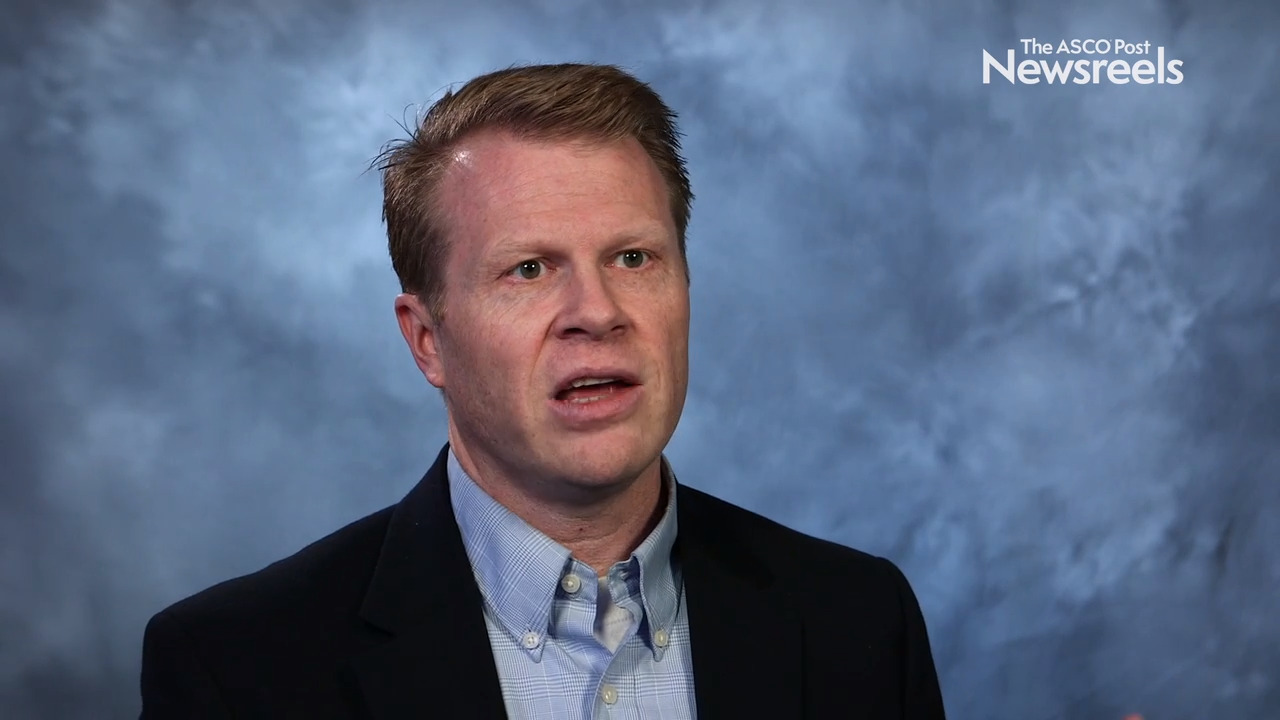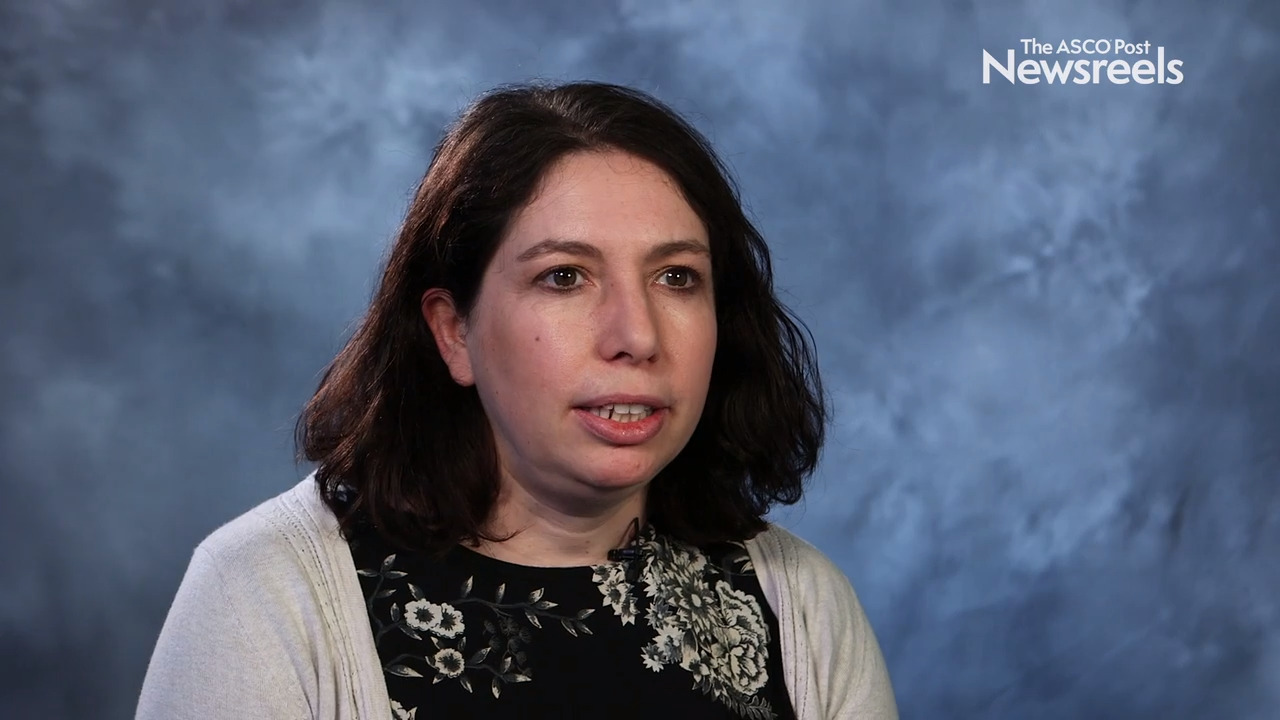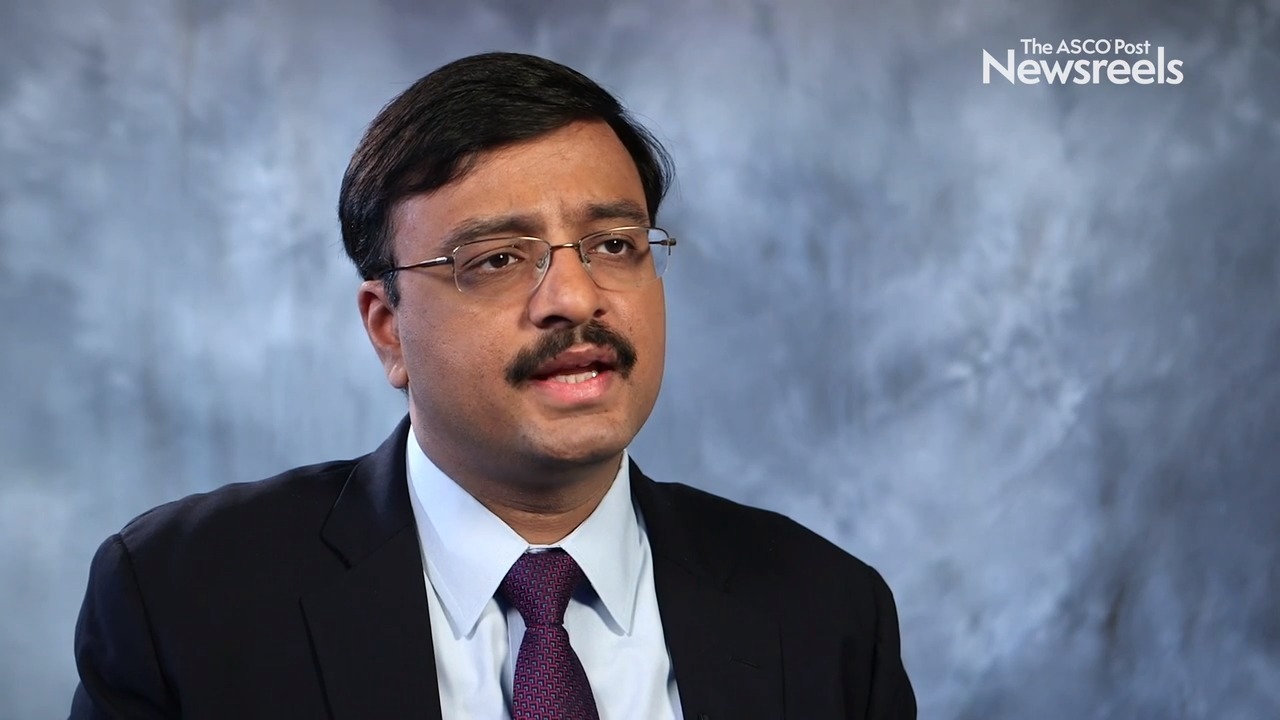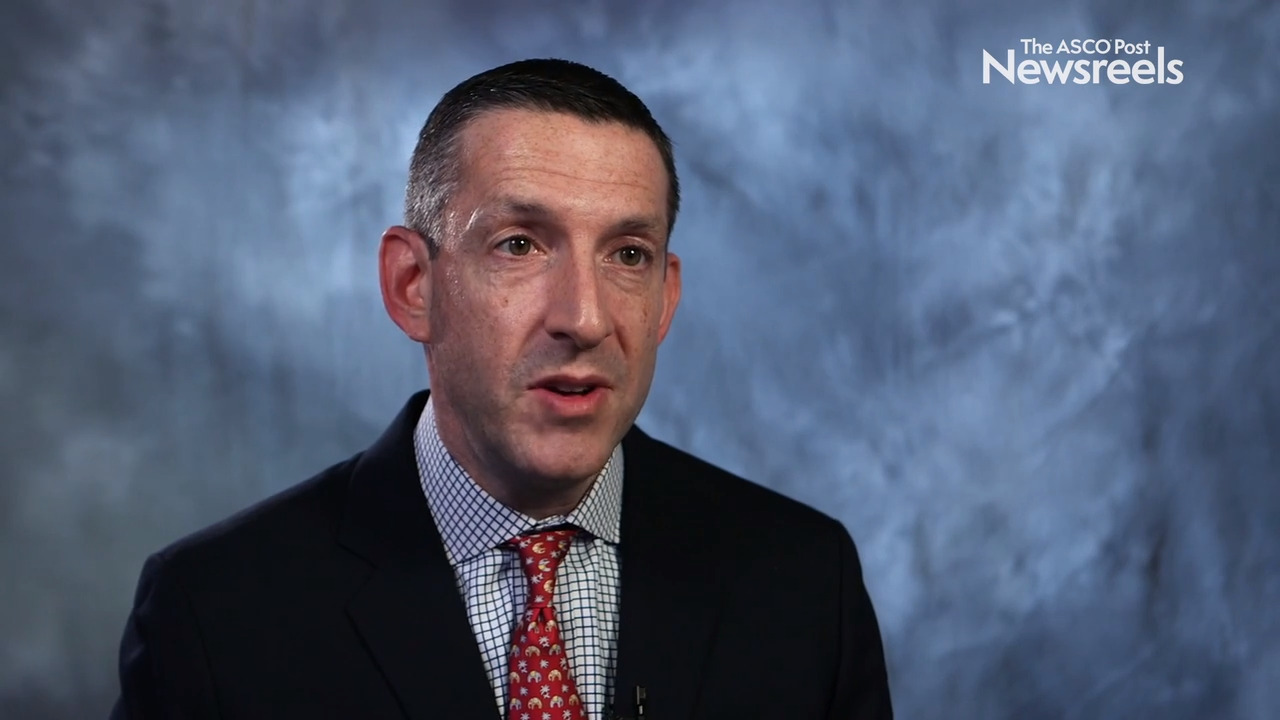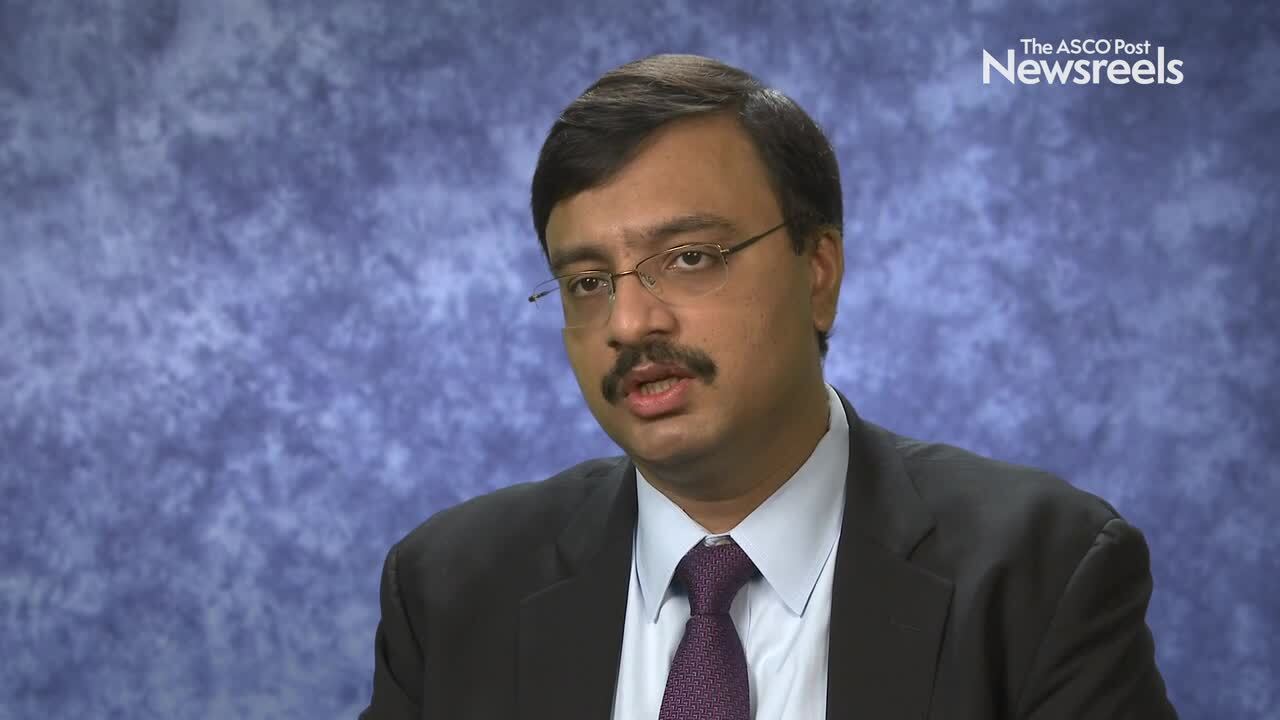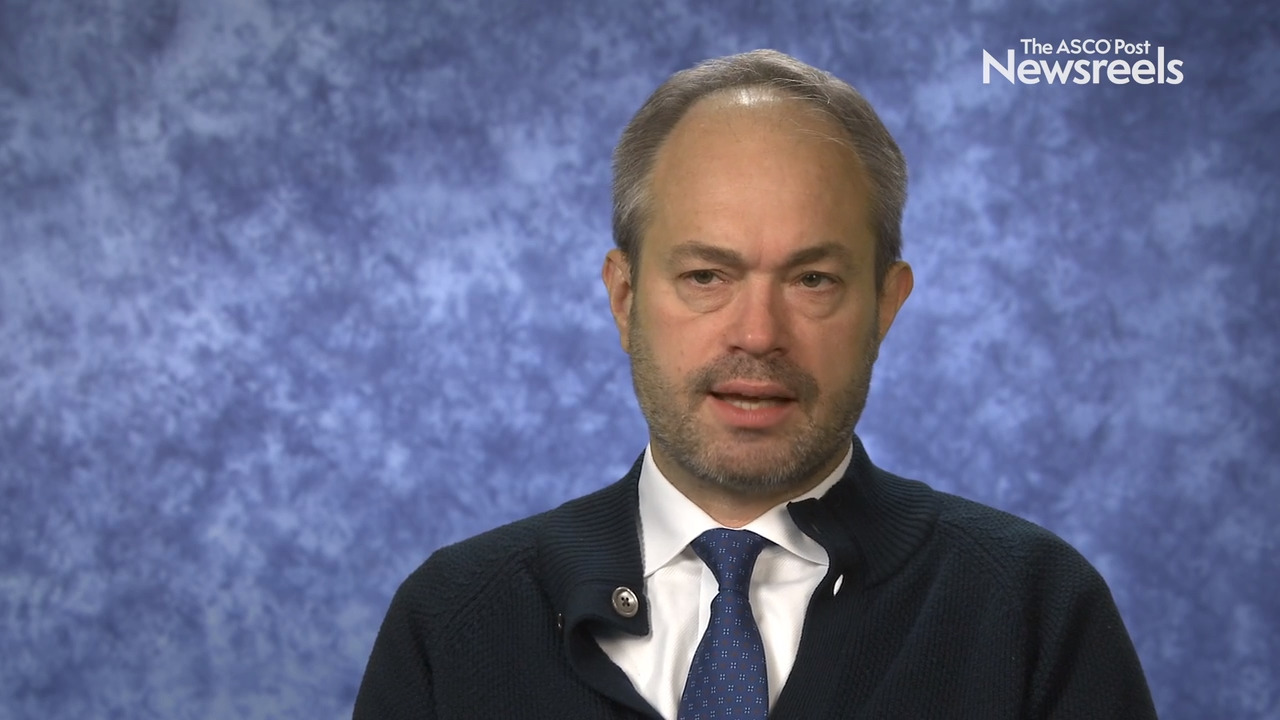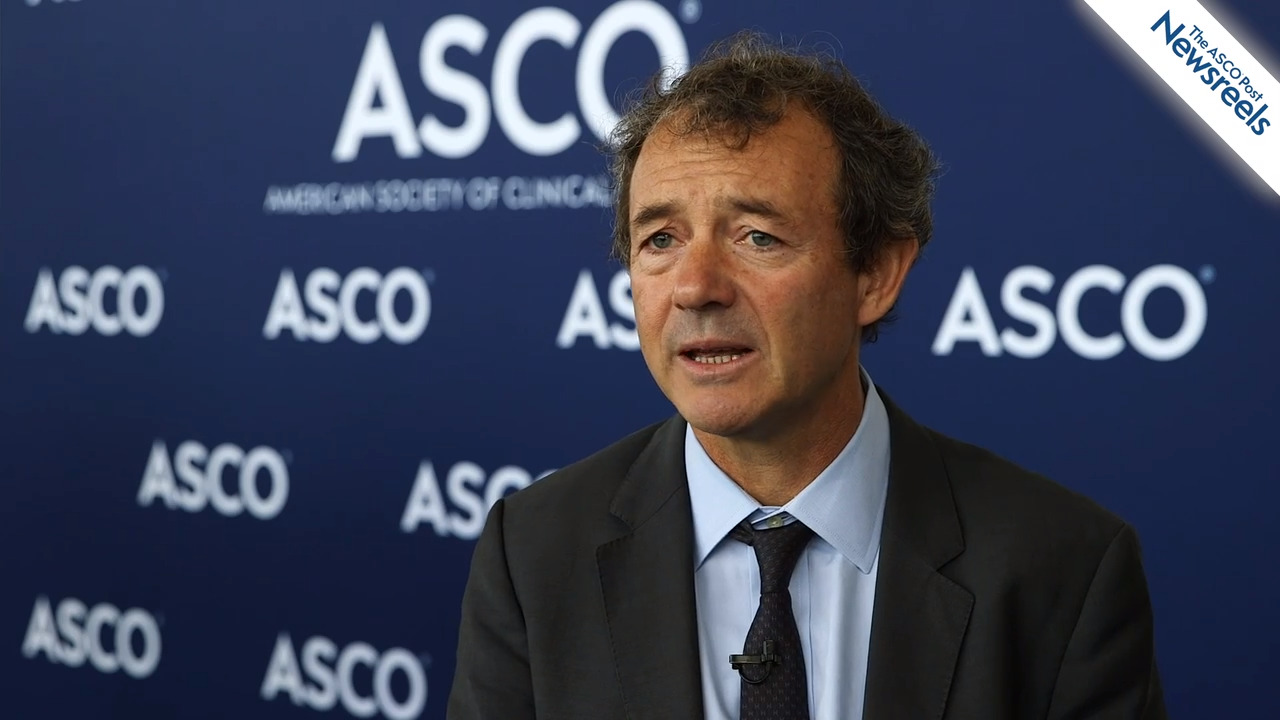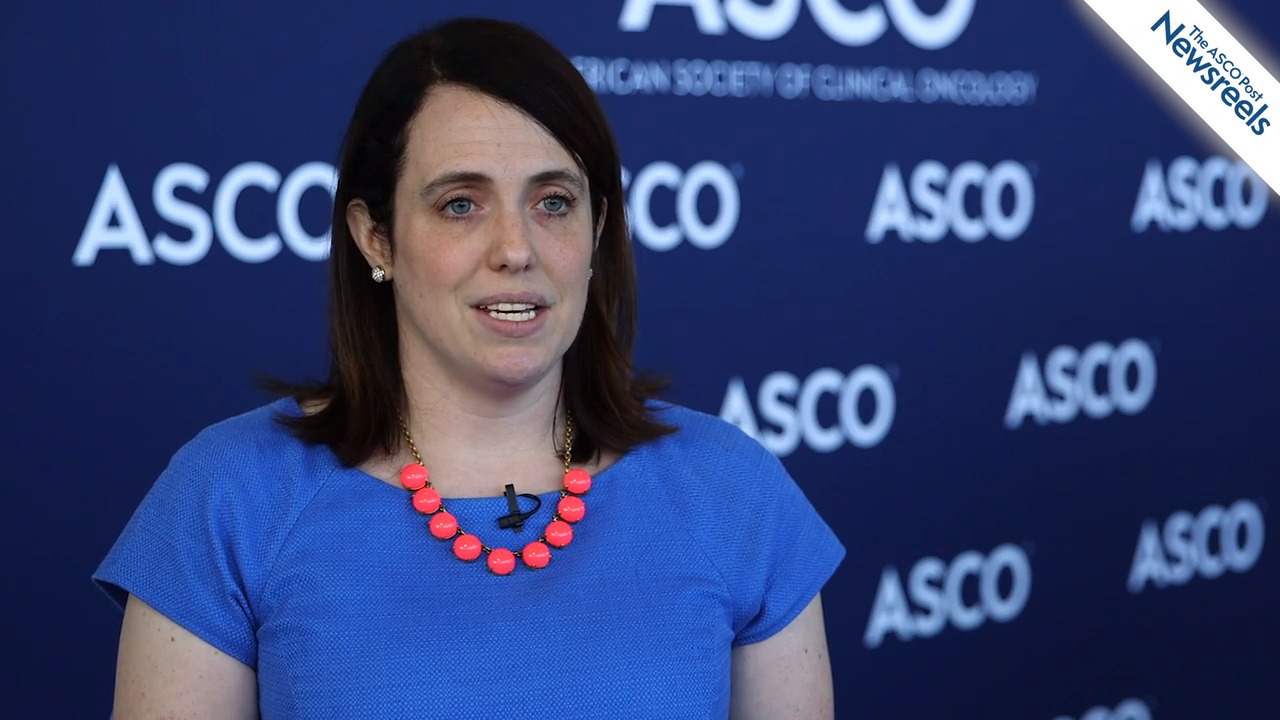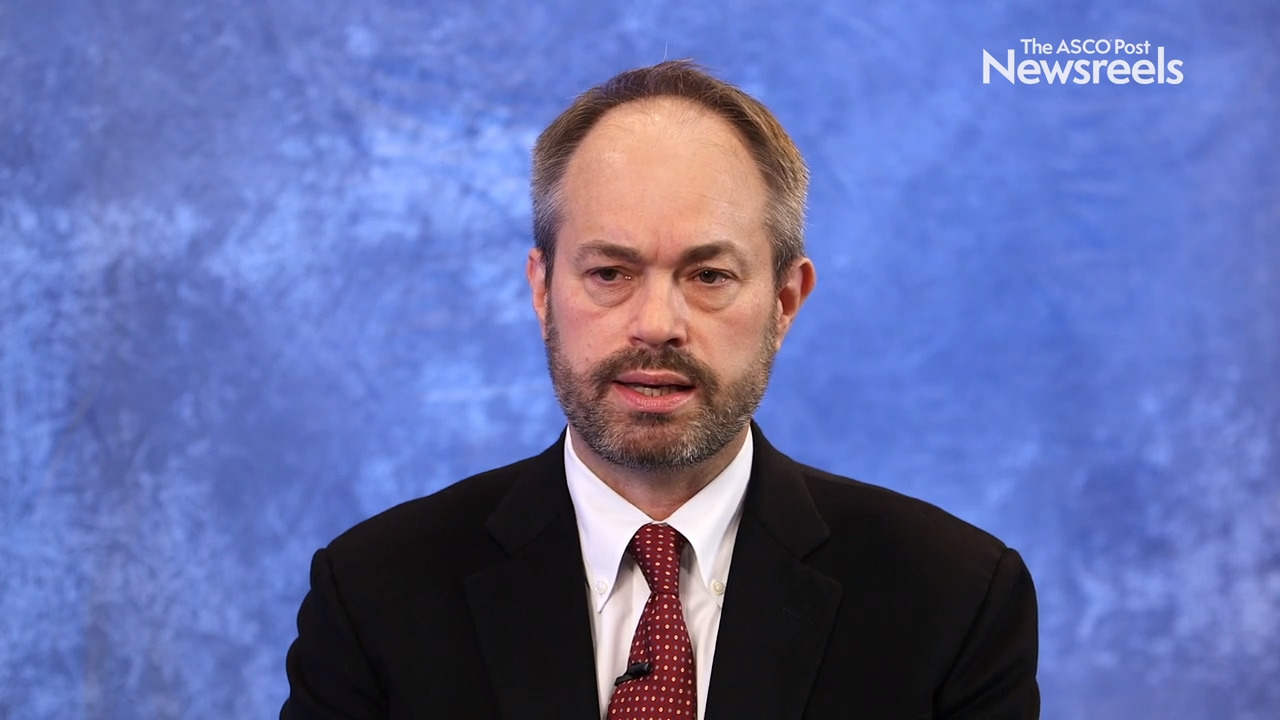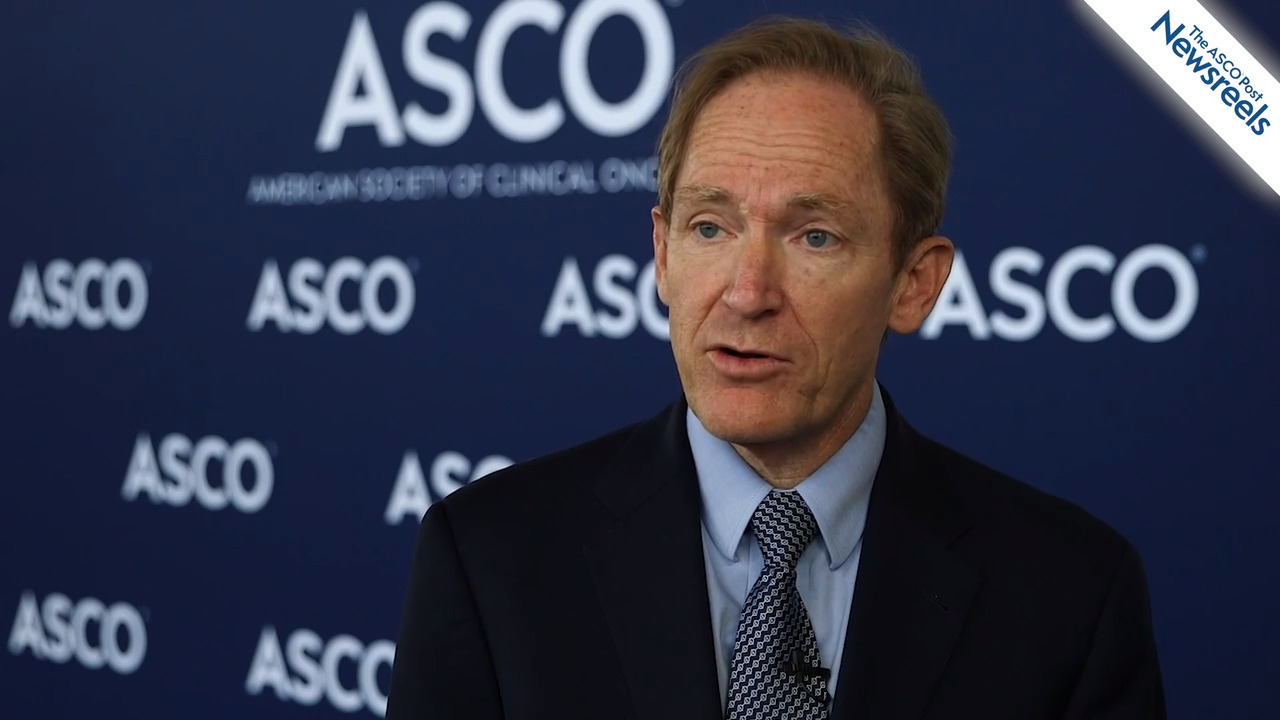Tait D. Shanafelt, MD, on CLL in Younger Patients: Comparing Ibrutinib and Rituximab With FCR
Tait D. Shanafelt, MD, of Stanford University, discusses extended follow-up data that show ibrutinib plus rituximab improved clinical outcomes vs the standard therapy of fludarabine/cyclophosphamide/ rituximab in younger patients with previously untreated chronic lymphocytic leukemia (Abstract 33).
Mhairi Copland, PhD, MB BChir, on Blast Phase CML: A Possible Treatment Advance
Mhairi Copland, PhD, MB BChir, of the University of Glasgow, discusses results of a study on the combination of ponatinib and fludarabine, cytarabine, idarubicin, and G-CSF for patients with blast phase chronic myeloid leukemia, a rare complication with a poor outcome (Abstract 497).
Nitin Jain, MD, on First-Line Ibrutinib Plus Venetoclax in CLL
Nitin Jain, MD, of The University of Texas MD Anderson Cancer Center, discusses findings from two studies showing that the combination of ibrutinib and venetoclax is an effective chemotherapy-free oral regimen for patients with high-risk, previously untreated chronic lymphocytic leukemia (Abstract 34).
Mikkael A. Sekeres, MD, on Newly Diagnosed Hematologic Malignancies: Early Trial Findings on Glasdegib Plus Azacitidine
Mikkael A. Sekeres, MD, of the Cleveland Clinic, discusses results of a phase Ib study of glasdegib in combination with azacitidine, which showed activity in patients with untreated myelodysplastic syndromes, acute myeloid leukemia, and chronic myelomonocytic leukemia who are ineligible for intensive chemotherapy (Abstract 177).
ASH 2019: Lower Area-Based Income and Educational Attainment Associated With Poorer Survival Among Pediatric Patients With AML
Children from lower-income neighborhoods were 2.4 times more likely to die during treatment for acute myeloid leukemia (AML) than children from middle- and high-income neighborhoods, according to findings from a study that analyzed nearly 1,500 clinical trial participants. While previous research...
Calaspargase Pegol-mknl for Pediatric and Young Adult Patients With Acute Lymphoblastic Leukemia
In late 2018, calaspargase pegol-mknl, an asparagine-specific enzyme, was approved for use as a component of a multiagent chemotherapeutic regimen for acute lymphoblastic leukemia (ALL) in pediatric and young adult patients aged 1 month to 21 years.1,2 The new product provides for a longer interval ...
Glasdegib in Older Patients With AML or Those With Comorbidities
In the Clinic provides overviews of novel oncology agents, addressing indications, mechanisms of action, administration recommendations, safety profiles, and other essential information needed for the appropriate clinical use of these drugs. Late in 2018, the Hedgehog pathway inhibitor glasdegib...
FDA Approves Acalabrutinib for CLL/SLL as Part of Project Orbis
On November 21, as part of Project Orbis—a collaboration with the Australian Therapeutic Goods Administration (TGA) and Health Canada—the U.S. Food and Drug Administration (FDA) granted supplemental approval to acalabrutinib (Calquence) for the treatment of adults with chronic lymphocytic leukemia...
Late Bone Marrow Relapse Risk Stratification in Pediatric Patients With B-Cell Acute Lymphoblastic Leukemia
In an analysis of the German ALL-REZ BFM 2002 trial, reported in the Journal of Clinical Oncology, Eckert et al found that postinduction minimal residual disease (MRD)-based treatment stratification resulted in “excellent survival” in pediatric patients with late relapse of B-cell precursor acute...
How Clonal Hematopoiesis of Indeterminate Potential Increases the Risk of Heart Disease and Blood Cancers as People Age
Although stem cells throughout the body acquire genetic mutations over time, usually these alterations do not affect how the stem cells function or cause disease. However, recent research in clonal hematopoiesis and aging has found an association between clonal expansion of hematopoietic cells with ...
Venetoclax for Chronic Lymphocytic Leukemia or Small Lymphocytic Lymphoma
On May 15, 2019, venetoclax was approved for the treatment of adult patients with previously untreated chronic lymphocytic leukemia (CLL) or small lymphocytic lymphoma (SLL).1,2 Supporting Efficacy Data Approval was based on findings from the open-label phase III CLL14 trial (ClinicalTrials.gov...
ADMIRAL: Gilteritinib vs Chemotherapy in Relapsed or Refractory FLT3-Mutated AML
As reported in The New England Journal of Medicine by Perl et al, the phase III ADMIRAL trial showed improved overall survival with the oral FMS-like tyrosine kinase 3 (FLT3) inhibitor gilteritinib vs salvage chemotherapy in patients with relapsed or refractory FLT3-mutated acute myeloid leukemia...
Asciminib/Imatinib in Patients With Previously Treated CML
In a phase I trial, the combination of the BCR-ABL1 inhibitor asciminib and the small-molecule kinase inhibitor imatinib showed preliminary efficacy, safety, and tolerability in patients with chronic myeloid leukemia (CML) resistant to or intolerant of treatment with two or more prior tyrosine...
FDA Pipeline: Treatments for HER2-Positive Breast Cancer, AML; Breakthrough Device for Prostate Cancer; Statement on Safety Information for Breast Implants
Recently, the U.S. Food and Drug Administration (FDA) granted Priority Review to trastuzumab deruxtecan for the treatment of HER2-positive metastatic breast cancer; granted Fast Track designation for bemcentinib for elderly patients with relapsed acute myeloid leukemia (AML); granted Breakthrough...
Gene Signature to Identify Benefit of Front-Line Fludarabine, Cyclophosphamide, and Rituximab in IGHV-Unmutated CLL
In a retrospective cohort study reported in The Lancet Oncology, Herling et al identified a 17-gene signature that distinguished patients with IGHV-unmutated chronic lymphocytic leukemia (CLL) more likely to achieve long-term remission after front-line chemoimmunotherapy with fludarabine,...
Debating the Role of Chemoimmunotherapy in the First-Line Setting of CLL
The advent of new targeted agents for chronic lymphocytic leukemia (CLL) has ushered in a golden age of treatment, leading to longer, more durable periods of disease control. Not all oncologists are convinced, however, that improvements in progression-free survival alone warrant dispensing with...
Nitin Jain, MD, on CLL: Is There a Role for Chemoimmunotherapy?
Nitin Jain, MD, of The University of Texas MD Anderson Cancer Center, discusses the debate on evolving strategies in first-line treatment of CLL.
William G. Wierda, MD, PhD, on Evolving Strategies for First-Line Treatment of CLL
William G. Wierda, MD, PhD, of The University of Texas MD Anderson Cancer Center, offers commentary on the debate about evolving strategies in first-line chronic lymphocytic leukemia, the clinical trials on such agents as ibrutinib, BTK inhibitors, and venetoclax, and the interest in chemoimmunotherapy as a fixed duration treatment.
FDA Pipeline: Advances in Prostate Cancer, Urothelial Cancer, Myelofibrosis, and More
In the past few weeks, the U.S. Food and Drug Administration (FDA) has issued regulatory decisions in prostate cancer, urothelial cancer, myelofibrosis, breast cancer, pediatric brain cancer, leukemia, and skin cancer. Breakthrough Therapy Designation for Niraparib in Metastatic...
SOHO 2019: Asciminib/Imatinib in Patients With Previously Treated CML
In a phase I trial, the combination of the BCR-ABL1 inhibitor asciminib and the small-molecule kinase inhibitor imatinib showed preliminary efficacy, safety, and tolerability in patients with chronic myeloid leukemia (CML) resistant to or intolerant of treatment with two or more prior tyrosine...
Having Cancer as a Teenager Derailed My Life Course
In 1994, I was a normal, active 15-year-old, who loved cars, sports, and rock music, especially songs from my favorite group, The Clash. In fact, it was while jubilantly dancing alone in my room to one of their tunes that I vomited into my hands, an early symptom of acute myeloid leukemia (AML). I...
FDA Pipeline: Fast Track Designation in Myelodysplastic Syndrome and AML, Plus Multiple Breakthrough Designations
Recently, the U.S. Food and Drug Administration (FDA) granted Fast Track designation to magrolimab in myelodysplastic syndrome and acute myeloid leukemia (AML). The agency also granted Breakthrough Therapy designations in lung cancer and desmoid tumors, as well as Breakthrough Device designations...
Risk of Infections in Survivors of Childhood Leukemia
In a study reported in the Journal of Clinical Oncology, Pelland-Marcotte et al found that survivors of childhood leukemia remained at significantly increased risk of infection compared with matched controls during an extended period following completion of treatment. Study Details The...
Chromosomal Abnormalities and Prognosis in NPM1-Mutant AML
In a study reported in the Journal of Clinical Oncology, Angenendt et al found that adverse-risk cytogenetics were associated with significantly poorer outcomes vs normal karyotype among patients with acute myeloid leukemia (AML) with a nucleophosmin 1 (NPM1) mutation. As stated by the...
FDA Pipeline: Designation in CLL, New Drug Application in GIST, New Prostate Ablation System Receives 510(k) Clearance
Recently, the U.S. Food and Drug Administration granted Breakthrough Therapy designation to acalabrutinib in chronic lymphocytic leukemia (CLL), accepted a new drug application for avapritinib in some types of gastrointestinal stromal tumors (GIST), and granted 501(k) clearance to market the...
Ibrutinib/Rituximab vs Standard Chemoimmunotherapy in Previously Untreated CLL
In an interim analysis of the phase III E1912 trial reported in The New England Journal of Medicine, Shanafelt et al found that ibrutinib/rituximab improved progression-free and overall survival vs standard chemoimmunotherapy in patients 70 years old or younger with previously untreated chronic...
FDA Pipeline: Label Update for Durvalumab in NSCLC; Applications Accepted in Epithelioid Sarcoma, AML
Recently, the U.S. Food and Drug Administration (FDA) approved the inclusion of overall survival from the PACIFIC trial in the U.S. prescribing information for durvalumab and accepted applications for a new drug in the treatment of epithelioid sarcoma and two orphan drugs in the treatment of acute...
Active Regimen for High-Risk and Older Patients With Previously Untreated Chronic Lymphocytic Leukemia
In a single-center phase II trial reported in The New England Journal of Medicine, Nitin Jain, MD, and colleagues found that the combination of ibrutinib and venetoclax was highly active in previously untreated high-risk and older patients with chronic lymphocytic leukemia (CLL). In the study, 80 ...
FDA Approves Rituximab Biosimilar for Non-Hodgkin Lymphoma, CLL, and Autoimmune Conditions
Today, the U.S. Food and Drug Administration (FDA) approved rituximab-pvvr (Ruxience), a biosimilar to rituximab (Rituxan), for the treatment of adult patients with non-Hodgkin lymphoma, chronic lymphocytic leukemia (CLL), and granulomatosis with polyangiitis and microscopic polyangiitis....
CLARITY: Ibrutinib Plus Venetoclax in Relapsed or Refractory Chronic Lymphocytic Leukemia
In the phase II CLARITY trial reported in the Journal of Clinical Oncology, Hillmen et al found that the combination of ibrutinib and venetoclax resulted in high rates of minimal residual disease eradication in patients with relapsed or refractory chronic lymphocytic leukemia (CLL). In the...
Anesthesia Exposure and Neurocognitive and Neuroimaging Outcomes in Long-Term Survivors of Childhood ALL
In a study reported in JAMA Oncology, Banerjee et al found that higher cumulative anesthesia exposure and duration of exposure during treatment of childhood acute lymphoblastic leukemia (ALL) may be associated with adverse neurocognitive and abnormal neuroimaging outcomes in long-term survivors....
Substitution of Clofarabine for Anthracycline/Etoposide in Induction Therapy for Pediatric Acute Myeloid Leukemia
In the phase III AML08 trial reported in the Journal of Clinical Oncology, Rubnitz et al found that the use of clofarabine instead of an anthracycline and etoposide in the first course of induction therapy may be a feasible strategy in pediatric patients with acute myeloid leukemia. The trial,...
FDA Approves First-Line Ivosidenib for IDH1-Mutated AML
On May 2, the U.S. Food and Drug Administration (FDA) expanded its approval of ivosidenib (Tibsovo) to include newly diagnosed acute myeloid leukemia (AML) with a susceptible IDH1 mutation, as detected by an FDA-approved test, in patients who are at least 75 years old or who have comorbidities that ...
Fixed-Duration Venetoclax Plus Obinutuzumab as First-Line Treatment in Older Patients With CLL Who Have Comorbidities
A fixed-duration regimen of venetoclax plus obinutuzumab demonstrated superior progression-free survival, complete response rates, and minimal residual disease (MRD) negativity compared with chlorambucil plus obinutuzumab as first-line therapy for older patients with chronic lymphocytic leukemia...
New NCCN Guidelines for Pediatric Acute Lymphoblastic Leukemia
Recently, the National Comprehensive Cancer Network® (NCCN®) debuted the NCCN Clinical Practice Guidelines in Oncology (NCCN Guidelines®) for Pediatric Acute Lymphoblastic Leukemia (ALL)—the most comprehensive and up-to-date, evidence-based, consensus-driven guidelines for treating children with...
Association of Antibodies With Pegaspargase Allergic Reactions and Failure of Rechallenge in Pediatric ALL
In a study reported in the Journal of Clinical Oncology, Liu et al determined the frequency of allergic reactions and consequences of development of antibodies to pegaspargase (PEG-ASP) among pediatric patients with newly diagnosed acute lymphoblastic leukemia (ALL). As noted by the...
EHA 2019: ASCEND Trial Compares Acalabrutinib vs Investigator’s Choice in Relapsed or Refractory CLL
The randomized, global, multicenter, open-label phase III ASCEND trial evaluated the efficacy and safety of acalabrutinib vs investigator’s choice of rituximab/idelalisib or rituximab/bendamustine in patients with relapsed or refractory chronic lymphocytic leukemia (CLL). Ghia et al presented ...
EHA 2019: CLL12 Trial Investigates Ibrutinib in Previously Untreated, Asymptomatic Early-Stage CLL
At the 24th Annual Congress of the European Hematology Association (EHA), Langerbeins et al presented findings from the phase III CLL12 trial, which evaluated whether ibrutinib prolongs event-free survival in patients with previously untreated, Binet stage A chronic lymphocytic leukemia (CLL)...
QuANTUM-R: Quizartinib vs Salvage Chemotherapy in Relapsed or Refractory FLT3-ITD–Positive AML
In the phase III QuANTUM-R trial reported in The Lancet Oncology, Cortes et al found that the FLT3 inhibitor quizartinib produced a modest but significant improvement in overall survival vs salvage chemotherapy in relapsed or refractory FLT3 internal tandem duplication (FLT3-ITD)-positive acute...
François-Xavier Mahon, MD, PhD, on Chronic-Phase Chronic Myeloid Leukemia: Treatment-Free Remission After Second-Line Treatment
François-Xavier Mahon, MD, PhD, of the Université Bordeaux and Institut Bergonie, discusses results of the ENESTop study, which demonstrated the long-term durability and safety of treatment-free remission in chronic-phase CML after second-line nilotinib (Abstract 7005).
2019 ASCO: CLL14 Trial Evaluates First-Line Venetoclax/Obinutuzumab in Previously Untreated CLL
The phase III CLL14 trial—reported by Fischer et al at the 2019 ASCO Annual Meeting (Abstract 7502) and in The New England Journal of Medicine—found that the BCL2 inhibitor venetoclax plus the monoclonal antibody obinutuzumab prolonged progression-free survival vs obinutuzumab and...
First-Line Ibrutinib and Venetoclax for High-Risk and Older Patients With Previously Untreated CLL
In a single-center phase II trial reported in The New England Journal of Medicine, Jain et al found that the combination of ibrutinib and venetoclax was highly active in previously untreated high-risk and older patients with chronic lymphocytic leukemia (CLL). In the study, 80 patients...
Kerry A. Rogers, MD, on Chronic Lymphocytic Leukemia: Acalabrutinib With Obinutuzumab in Treatment-Naive and Relapsed or Refractory Disease
Kerry A. Rogers, MD, of The Ohio State University, discusses a 3-year follow-up of phase Ib safety and efficacy findings with the selective BTK inhibitor acalabrutinib and the anti-CD20 monoclonal antibody obinutuzumab in patients with CLL (Abstract 7500).
William G. Wierda, MD, PhD, on Immunotherapy for Relapsed/Refractory CLL/SLL: Results From TRANSCEND CLL 004
William G. Wierda, MD, PhD, of The University of Texas MD Anderson Cancer Center, discusses the TRANSCEND CLL 004 trial, which studied the use of an experimental CD19-directed CAR T-cell product in heavily pretreated patients with chronic lymphocytic leukemia or small lymphocytic lymphoma (Abstract 7501).
Mark J. Levis, MD, PhD, on Acute Myeloid Leukemia: Gilteritinib in FLT3-Mutated Disease
Mark J. Levis, MD, PhD, of The Sidney Kimmel Comprehensive Cancer Center at Johns Hopkins University, discusses the effect of gilteritinib on survival in patients with FLT3-mutated relapsed/refractory AML who have common co-mutations or a high FLT3-ITD allelic ratio, and the importance of FLT3-ITD testing at diagnosis and again at relapse (Abstract 7000).
FDA Approves Addition of Survival Data to Gilteritinib Label for Refractory FLT3-Mutated AML
On May 29, the U.S. Food and Drug Administration (FDA) approved the addition of overall survival data in the labeling for gilteritinib (Xospata), which is indicated for adult patients who have relapsed or refractory acute myeloid leukemia (AML) with an FLT3 mutation as detected by an FDA-approved...
FDA Approves Chemotherapy-Free Regimen, Venetoclax Plus Obinutuzumab, as First-Line Treatment for CLL/SLL
On May 15, the U.S. Food and Drug Administration (FDA) approved venetoclax (Venclexta) in combination with obinutuzumab (Gazyva) for the treatment of adult patients with previously untreated chronic lymphocytic leukemia (CLL) or small lymphocytic lymphoma (SLL). Approval was based on the CLL14...
FDA Approves First-Line Ivosidenib for IDH1-Mutated AML
On May 2, the U.S. Food and Drug Administration (FDA) expanded its approval of ivosidenib (Tibsovo) to include newly diagnosed acute myeloid leukemia (AML) with a susceptible IDH1 mutation, as detected by an FDA-approved test, in patients who are at least 75 years old or who have comorbidities that ...
NCCN Clinical Practice Guidelines in Oncology: 2019 Updates
In 1996, the National Comprehensive Cancer Network® (NCCN®) published its first set of Clinical Practice Guidelines in Oncology (NCCN Guidelines®), covering eight tumor types. NCCN Guidelines are now published for more than 70 tumor types and topics. Some of the key updates for 2019 were presented...
FDA Pipeline: Designations in Myeloma, Adenoid Cystic Carcinoma, and Kaposi Sarcoma, Plus ODAC Votes
This week, the U.S. Food and Drug Administration granted designations in relapsed or refractory multiple myeloma, adenoid cystic carcinoma, and Kaposi sarcoma; and the FDA’s Oncologic Drugs Advisory Committee (ODAC) held votes on treatments for tenosynovial giant cell tumor and acute...
